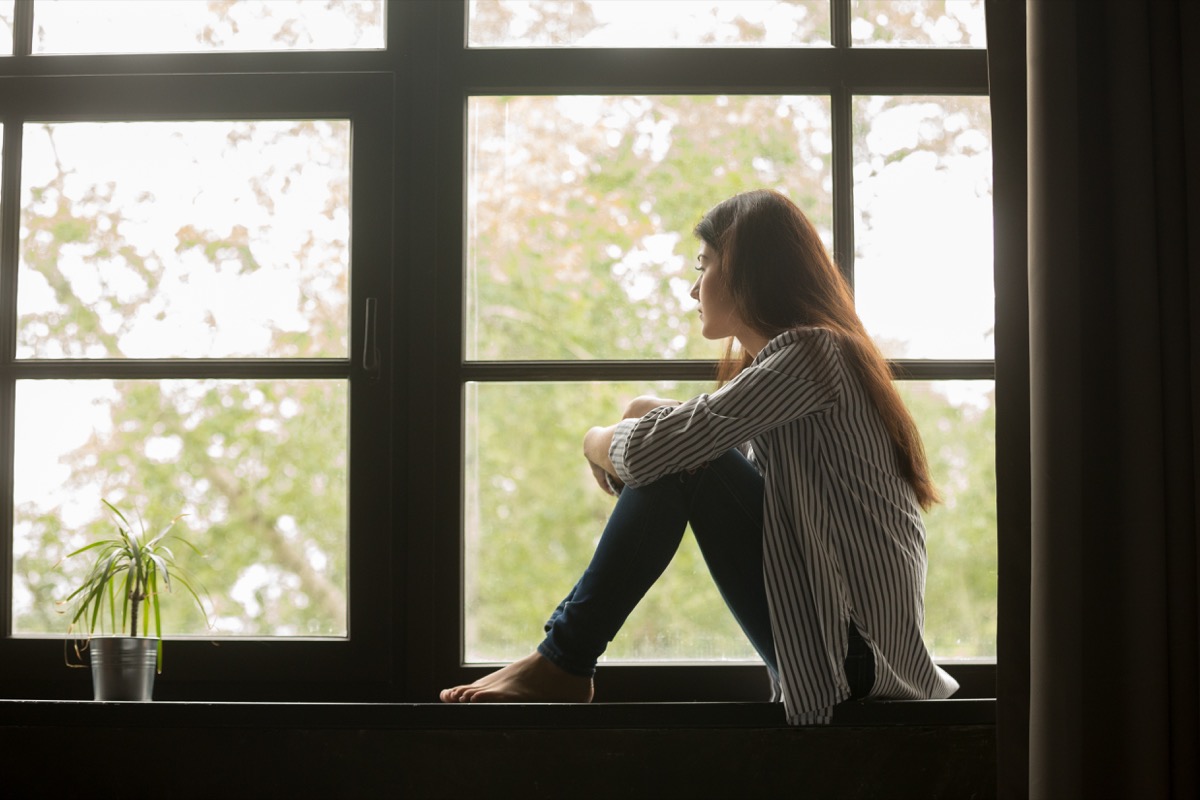This Common Issue Is Making You Anti-Social, New Study Says

There's nothing wrong with some quality alone time. We all know how relaxing and enjoyable a quiet evening at home can be, but at the same time, no one is an island. Spend too much time in solitude, and you're almost certain to start going a bit stir crazy.
Moreover, tons of research projects and studies have shown that maintaining an active social life is good for our minds, bodies, and overall well-being. For instance, this study published in the scientific journal Personal Relationships reports friendships are actually more important than family when it comes to promoting robust health and overall life satisfaction. Another report published in PLOS Medicine concludes older adults who make time for social interactions each and every day are much less likely to develop dementia.
Maintaining an active social schedule is often harder than it sounds, however. We all lead busy, hectic lives and between work, hobbies, and personal responsibilities, missed calls and texts from old friends frequently go unanswered. Meanwhile, it's even harder to make new friends. One survey of 2,000 Americans even found that the average adult hasn't made a new meaningful social connection in five years! Similarly, 45% of that poll's participants admitted they find it very hard to make new friends.
While many may explain their lack of social activity entirely on a packed schedule or lack of time, a fascinating new piece of research reports there may be another overlooked factor at play. Published in the scientific journal Emotion and conducted at Dartmouth College, the study concludes a near-universal complaint about modern living may be making many of us anti-social. Read on to learn more, and next, check out One Major Effect Exercise Has on Your Happiness.
Stressed today, isolated tomorrow

Feelings of overwhelming stress are troublingly common nowadays, and this research indicates a particularly stressful Tuesday can lead to an isolated Wednesday. The team at Dartmouth reports that levels of stress on a given day appear to accurately predict social interaction the following day. In other words, feeling extra stressed one day promotes anti-social behavior the next.
"For our study, we wanted to investigate how feeling stressed impacts the amount that we socialize with others," explains senior author Meghan Meyer, an assistant professor of psychological and brain sciences at Dartmouth and director of the Dartmouth Social Neuroscience Lab. "Our findings show that people who experienced more stress on one day, socialized less with others the next day. This effect may persist for up to two days later after someone has had a stressful day."
One would assume that tons of research had already been performed on the influence of stress on subsequent social tendencies, but this study is one of the first.
"By leveraging mobile sensing technology, our research is among the first to examine the temporal relationship between stress and socialization," comments study co-author Alex daSilva, Guarini '21, a Ph.D. student in psychological and brain sciences at Dartmouth. "Our findings showed that higher levels of stress on one day predicted decreased social interaction the next day while accounting for levels of movement, sleep, and time spent at home."
All in all, study authors believe their work represents the first "concrete" piece of evidence that stress makes humans anti-social. So, the next time you find yourself canceling Friday night plans in favor of some solitary couch time, take a moment and think back on yesterday. Chances are you had an especially stressful Thursday.
Related: Sign up for our newsletter for the latest health and wellness news!
The research

While "stress-induced social avoidance" has been observed and confirmed among a number of animals, it's been difficult to come to the same conclusions for humans. This is mostly due to researchers lacking the methods needed to track the effect of stress on social tendencies in real-time. The limited prior research on this matter among humans had relied entirely on subjective self-reports on social behavior from participants, which is hardly reliable as scientific data.
To get a more accurate idea of the relationship between stress and sociability, this study's authors used an app that collected mobile phone sensing data. For a full two months, 99 Dartmouth undergraduate students had their sleep, movements, and time spent at home recorded. There were slightly more female (56%) than male (44%) participants, but all collected data was anonymized to protect everyone's privacy.
The smartphone app measured social interactions among the students by detecting human conversations. Importantly, actual conversations and sounds were not recorded for obvious ethical reasons. Additionally, students were randomly asked by the app over the course of each day about how stressed they were feeling by selecting an image they related to at that moment. These image-based prompts would arrive at any time between 9 AM and 8 PM, and corresponded to a scale of 1 (not stressed at all) to 16 (extreme stress). For example, an image of a tranquil lake corresponded with low stress levels, while a picture of someone pulling out their hair signified an especially stressful day.
The two-month collection period allowed researchers to form an accurate idea of each participants' stress/sociability patterns. Study authors were also sure to consider and account for additional potentially difference-making lifestyle factors known to influence social behaviors such as sleep patterns, general movement, and time spent at home.
Related: I Took all Social Media Off My Phone 14 Months Ago, And I'm a Different Person Now
No gender differences

The finding that stress today promotes isolation tomorrow held up across the board among both men and women. Also, while not all that surprising, the study adds that spending more time at home and not moving all that much doesn't help when it comes to being more social. More social interaction is linked with less time spent at home and more movement.
Another conclusion worth reporting is that the relationship between stress and social activity does not appear to work both ways. The research team explains that while stress one day can predict social decisions the next, social interactions on a given day do not predict how stressed one may feel by the following afternoon.
Related: Sitting For This Long Every Day Is Dangerous, New Study Says
A vicious cycle

Considering how important social contact is to a well-rounded, rewarding life, the influence of stress on social tendencies is quite troubling. Spending time with others is good for our mental health, but when we're stressed we want to be alone, which usually only makes mental matters worse! This can lead to a repeating cycle of being stressed out and subsequently isolating oneself only to end up feeling even more on edge.
This work focused on college students, but the message is important for people of all ages: Even if you're not loving the idea of seeing other people after a stressful day, week, or month, push yourself and make the effort. By the time you're back home, you'll be happy you broke out of your shell for even just a short period of time.
"College is a time when a lot of mental health issues emerge in young adults. At the same time, previous research has shown that being integrated into your social network is really good for mental health, as it buffers mental health issues in a number of ways," Prof. Meyer concludes. "Stress is a big risk factor for the onset of a lot of mental health conditions and it often precedes the onset of depression and anxiety disorders. If students are stressed and then they withdraw from their social environment in response, they may be missing these opportunities to use their social interaction to buffer their mental health issues. They're withdrawing from people at a time when they may need them most."
For more, check out how depression in your 20s and 30s can wreak havoc on your brain later, according to science.








